Schema Markup and Its Many SEO Benefits
In the vast land of the World Wide Web, every marketer wants their websites to stand out, attract visitors, and climb the ranks of search engine results. They compete for attention by using various proven website optimization tricks; Schema Markup being one of them. Curious to know the infinite scheme markup benefits that lead to the ultimate SEO success? Stay tuned to find out.
Schema Markup benefits may sound quite technical (and scary). Still, it’s one of the best levers in SEO that can boost your website’s performance and amplify its visibility in search engine results.
At its core, Schema Markup benefits will help you understand how Schema helps search engines understand the content on your website more effectively.
Therefore, to help you understand, we’ll break down the various Schema Markup benefits in simple terms so you’ll not only be aware of its significance but will also learn how to harness its potential to improve your website’s ranking.
On that note, let’s discover what schema markup benefits exist out there and how Schema can be the game-changer your website needs.
What Is Schema Markup?
Before jumping into the Schema Markup benefits, first, let’s shed some light on what it means.
Schema Markup is a method used for converting unstructured data into structured data code. Which, when added to a website’s HTML, helps search engines understand and interpret the content (text, images, videos, etc.) on the webpage.
It provides additional context about the information presented on a webpage. Which makes it easier for search engines to understand, categorize, and display relevant search results.
What Is Schema?
Schema, in simple terms, is a structured way of organizing data. It’s like a universal dictionary with specific vocabulary or a set of standardized tags that defines what certain terms mean. Which, when applied to websites, helps search engines interpret the content’s context and meaning.
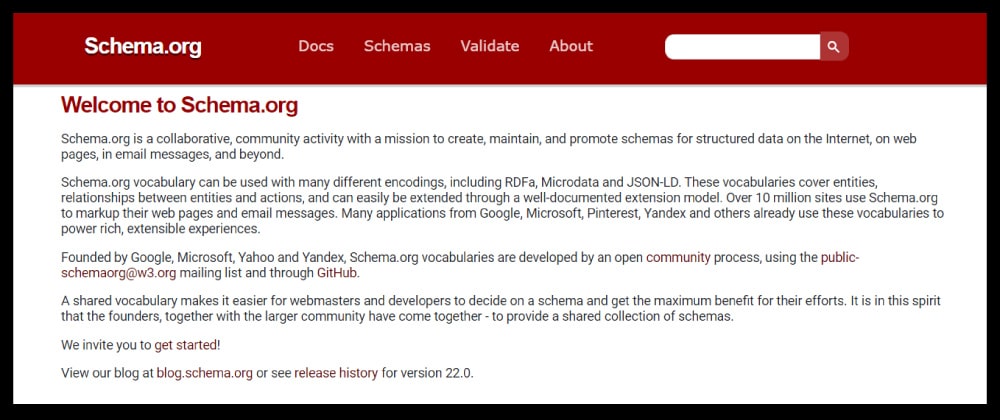
What is Schema.org?
Schema.org is the collaborative brainchild of search engines like Google, Bing, Yahoo, and Yandex. It serves as the official library for Schema Markup vocabulary.
Schema.org provides documentation on how to use these schemas effectively, making it easier for search engines to interpret your content consistently, no matter which one you’re optimizing for.
Also read: 7 Do’s and Don’ts of Backlink Building and Tips for Avoiding Penalties
Why Is Schema Markup Important for SEO?
Schema Markup is an SEO goldmine! When search engines get a clear understanding of your content, they can present it in a more visually appealing and informative way on the search results page. This enhanced presentation, thanks to rich snippets, attracts users’ attention and increases the chances of getting clicked.
Higher click-through rates mean more organic traffic to your website.
Moreover, Schema Markup also helps search engines rank your content for more specific and relevant keywords, improving your site’s overall SEO performance.
Now, let’s move on to discuss the main topic of our discussion today, that is, the Schema markup benefits that you get from utilizing schema for your website.
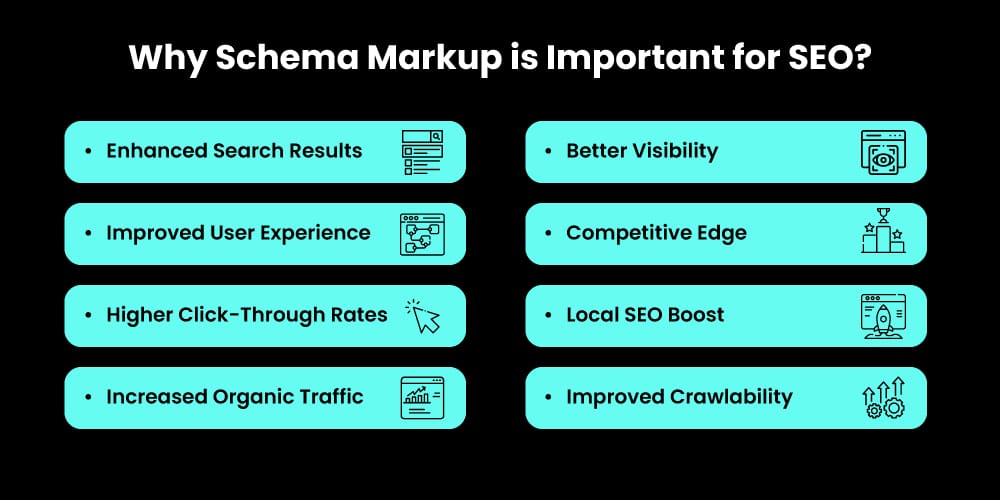
Schema Markup Benefits
Let’s dive into the numerous Schema Markup benefits that bring to your SEO success:
- Enhanced Visibility: Schema Markup adds rich snippets to your search results, making them stand out and capturing user attention.
- Higher Click-Through Rates: Rich snippets provide valuable information upfront, encouraging users to click on your result.
- Improved User Experience: Users get a preview of what your page offers, resulting in more targeted visits and reduced bounce rates.
- Increased Organic Traffic: Better visibility and click-through rates translate to more visitors from search engines.
- Ranking Advantage: Schema Markup enriches your content’s context, leading to better positioning for targeted keywords.
- Competitive Edge: Amidst the crowd of competitors, rich snippets make your result stand out. Even if you’re not the top-ranked result.
- Local SEO Boost: Local Business schema helps brick-and-mortar stores get noticed by nearby customers.
- Structured Data Knowledge Graph: Schema helps search engines build a comprehensive Knowledge Graph about your content, improving its contextual understanding.
- Voice Search Enhancement: Schema data primes your content for voice search, assisting voice search platforms to provide accurate and relevant answers.
- Adaptability and Accessibility: As search engines evolve, Schema Markup ensures your content remains accessible and well-presented across different platforms and devices.
Some additional schema markup benefits include how Schema helps reduce the time it would usually take to get your pages indexed or the time it would take your site to climb the search engine ladder.
In conclusion, as you learn about the various Schema Markup benefits, it gets easier to understand how Schema plays a pivotal role in optimizing your website’s SEO performance, offering enhanced visibility, improved user experience, and a competitive edge in the ever-evolving digital landscape.
Also read: 7 Link-Building Strategies for Improving Off-Page SEO
Types of Schema Markup and When to Use Them
As mentioned in the schema markup benefits section above, by selecting the appropriate Schema, you can provide search engines with better context about your content and improve its visibility.
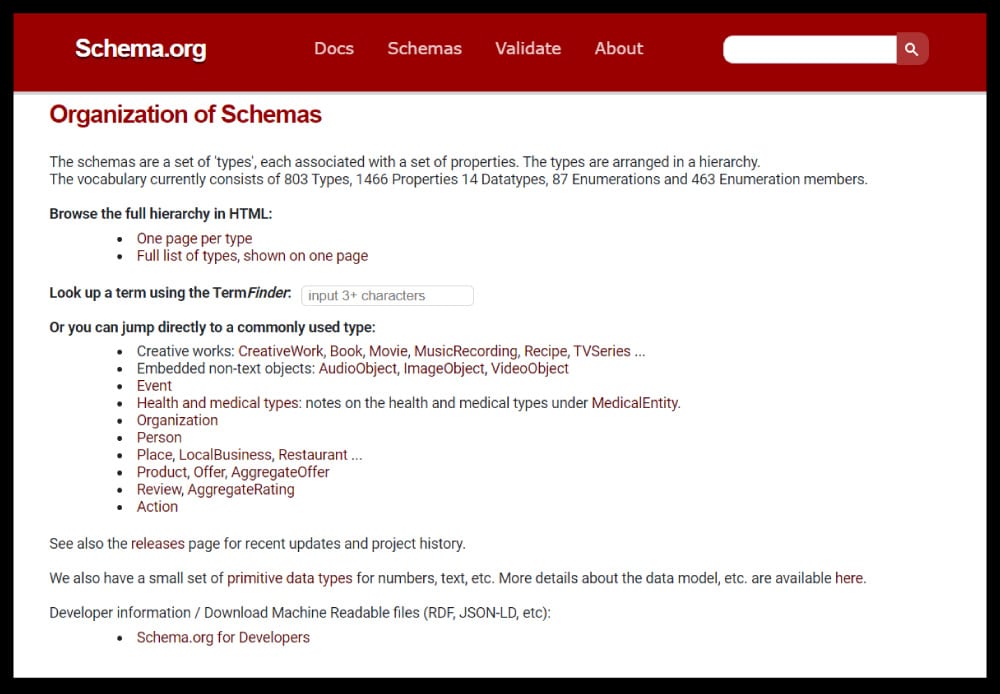
There are various types of schema markup available for different types of content. Some of the most popular types include:
Article Schema
This schema is your go-to for news articles, blog posts, or any written content. It holds details about the article, such as its title, author, publication date, and a concise summary.
Local Business Schema
If you own or manage a local business, this schema is your digital business card. It offers search engines specific information about your business, like its physical address, phone number, working hours, and even customer reviews.
Product Schema
For online shops and e-commerce sites, this schema acts as a virtual shopkeeper equipped with details about your products—prices, availability, descriptions, and even customer ratings.
Event Schema
If you are hosting an event, this schema is your digital event manager. It holds specifics like the event’s date, location, featured performers, and ticket information.
Recipe Schema
If you’re a culinary enthusiast, the Recipe schema is your secret ingredient. It helps search engines understand your recipe’s ingredients, cooking time, and even nutrition information.
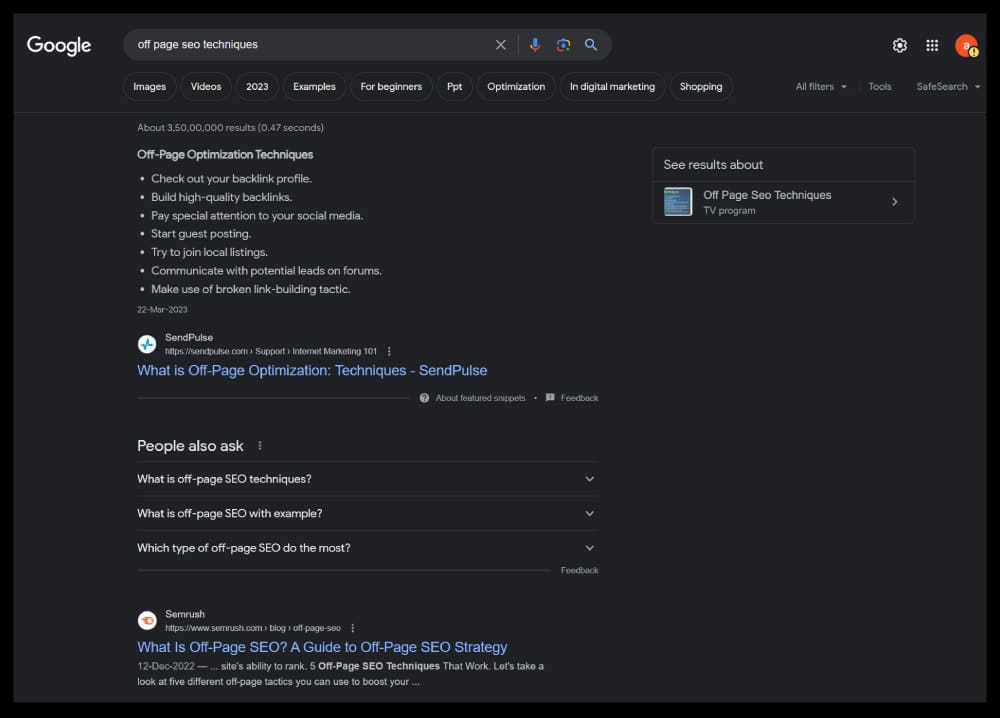
Review Schema
The Review schema works like your digital feedback box. It enables you to add ratings and reviews to products, services, or any other entity.
Video Schema
If you’re a content creator, the Video schema is your director’s chair. It lets you structure your video’s title, description, duration, and even a captivating thumbnail.
FAQ Schema
Helping customers with common queries? The FAQ schema is your digital support desk. It organizes your Frequently Asked Questions in a structured manner, making it simpler for search engines to present helpful answers directly in search results.
How to Generate Schema Markup
You don’t need to be a coding wizard to generate Schema Markup. Several online tools and generators are available that make the process easy. For example, you can use Google’s Structured Data Markup Helper to generate the HTML code. Just enter the necessary information about your content, and they’ll produce the appropriate Schema Markup code for you.
How to Add Schema Markup on Your Website
To add schema markup to your webpage, you need to add the generated schema code within the HTML of your webpage. There are a few methods to add Schema Markup, such as JSON-LD, RDFa, and Microdata.
The most common one that is usually preferred everywhere is JSON-LD (JavaScript Object Notation for Linked Data).
This can be done manually by editing the HTML code or by using a content management system (CMS) that supports schema markup. Certain CMS platforms also have plugins or integrations that make it easier to add and manage schema markup.
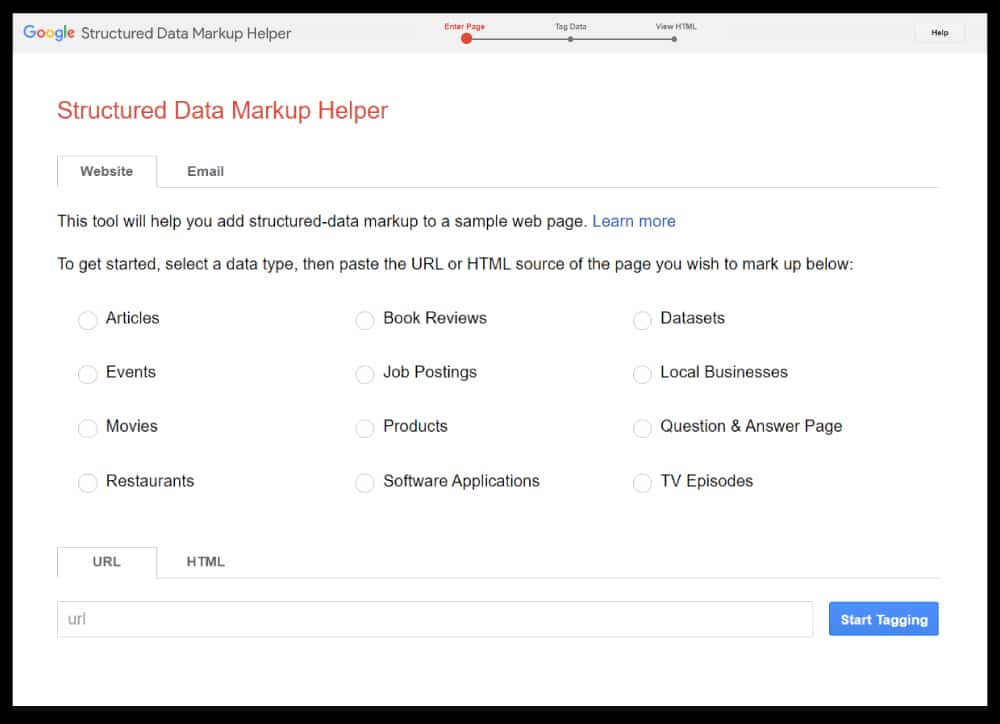
How to Test and Monitor Your Schema Markup
To check whether your code is accurate or not, you can test it with Google’s Structured Data Testing Tool. This tool allows you to input the URL of your webpage or directly input the HTML code to check for any errors or issues. It also lets you see the preview of how your rich snippets will appear in search results.
Conclusion
Now that you’re aware of the various Schema markup benefits, we can conclude that it’s a powerful tool that can significantly boost your website’s SEO efforts. It’s an important component of SEO strategy that helps search engines comprehend and present your content in a more meaningful way.
So, in a nutshell, we can say there are several amazing Schema Markup benefits that you can take advantage of to boost your brand’s SEO. They enhance the appearance of your content in search results, increasing the likelihood of getting clicked. This, in turn, increases organic traffic to your site. Additionally, rich snippets provide more context about your content, leading to better rankings and improved overall SEO performance.
So, if you want to give your website an SEO advantage, consider the numerous Schema Markup benefits you’ll gain and watch your online presence thrive!
Also read: 20 Most Frequently Asked SEO Questions Answered
Frequently Asked Questions (FAQs) related to Schema Markup
Q: Where can I put schema data, website head, body, or foot?
A: Schema data is typically placed in the head section of your website’s HTML code using JSON-LD or Microdata formats. Placing it in the head section ensures that search engines can easily access and interpret the structured data while crawling your website.
Q: Is Schema.org markup supposed to be visible?
A: No, Schema.org markup is not meant to be visible on your website. It is added to the HTML code, but it does not affect how your content appears to users. Its purpose is to provide additional information to search engines to enhance search results with rich snippets.
Q: Can you implement Schema.org tags within Metadata?
A: Yes, you can use Schema.org tags within Metadata. Adding Schema code to your Metadata lets search engines gain a better understanding of the content. This helps improve the visibility of your website in search results.
Q: What are some important Schema Markup benefits?
A: By incorporating Schema on your website, you unlock numerous schema markup benefits. Such as, it enables search engines to interpret and extract vital information about your content, contributing to enhanced visibility, improved user experience, and increased organic traffic.
Q: What is microdata schema.org in SEO?
A: Microdata is one of the formats used to implement Schema.org markup. It is a way of nesting structured data within the HTML content of your website. By using Microdata to add Schema Markup, you provide search engines with context and meaning for your content. Which positively impacts your overall SEO.
Q: Should I add a schema markup to all my pages?
A: While it’s not mandatory, adding Schema Markup to all relevant pages on your website can be beneficial. It provides search engines with a better context and understanding of your entire website’s content. This leads to more informative and visually appealing search results.
Q: What are the main Schema Markup benefits in blogging?
A: The main schema markup benefits in blogging are to improve the visibility of your blog content in search results, and make your blog posts more appealing to users, leading to increased click-through rates and higher organic traffic.
